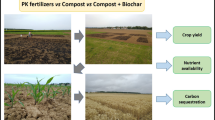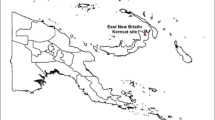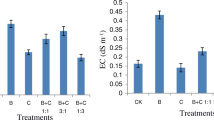Abstract
In the present study, the effects of co-composts of biochar (BC) and farm manure (FM) on the growth of wheat (Triticum aestivum L.) and carbon mineralization in an alkaline soil were investigated. The co-composts of FM and BC were prepared at various ratios (FM100:BC0, FM75:BC25, FM50:BC50, FM25:BC75, FM0:BC100) using aboveground piles and were used in two separate experiments conducted simultaneously. In the plant growth trial, prepared co-composts were applied at a rate of 2% w/w and wheat was grown at two fertilizer levels (half and full) until maturity. In the incubation experiment, same treatments were used and carbon mineralization was studied over a period of 79 days. The priming effect and net CO2 efflux were calculated using CO2 release data. Analysis of postincubation soil showed no significant effect of treatments on the pH of soil. However, electrical conductivity and organic matter were significantly influenced by all treatments. The increasing BC ratio in the compost reduced the carbon mineralization in soil in a dose-additive manner. Increase in BC proportion in composts (FM50:BC50, FM25:BC75, FM0:BC100) stabilized the native carbon of the soil and caused negative priming effect (−1.9, −5.6, and −8.48%, respectively). Regarding plant growth, the results showed an enhancement in the grain yield with the application of compost than control. Total nitrogen (N), phosphorus, and potassium (K) contents of the soil were also increased by the application of compost than control (un-amended soil). Significantly higher N and K concentrations in wheat plants were also examined when soil was treated with compost than control. The use of compost with half fertilizer was better in increasing grain yield, especially with higher BC proportion in the compost than FM.





Similar content being viewed by others
References
Abbas T, Rizwan M, Ali S et al (2017) Effect of biochar on cadmium bioavailability and uptake in wheat (Triticum aestivum L.) grown in a soil with aged contamination. Ecotoxicol Environ Saf 140:37–47
Agegnehu G, Bass AM, Nelson PN et al (2015) Biochar and biochar-compost as soil amendments: effects on peanut yield, soil properties and greenhouse gas emissions in tropical North Queensland, Australia. Agric Ecosyst Environ 213:72–85
Agegnehu G, Srivastava AK, Bird MI (2017) The role of biochar and biochar-compost in improving soil quality and crop performance: a review. Appl Soil Ecol 119:156–170
Ali S, Rizwan M, Qayyum MF et al (2017) Biochar soil amendment on alleviation of drought and salt stress in plants: a critical review. Environ Sci Pollut Res 24:12,700–12,712
Amlinger F, Peyr S, Geszti J et al (2007) Beneficial effects of compost application on fertility and productivity of soils. In: literature study, federal ministry for agriculture and forestry, environment and water management, Austria
Awasthi MK, Wang Q, Chen H et al (2017) Evaluation of biochar amended biosolids co-composting to improve the nutrient transformation and its correlation as a function for the production of nutrient-rich compost. Bioresour Technol 237:156–166
Awasthi MK, Wang Q, Huang H et al (2016) Effect of biochar amendment on greenhouse gas emission and bio-availability of heavy metals during sewage sludge co-composting. J Clean Prod 135:829–835
Ayari F, Hamdi H, Jedidi N et al (2010) Heavy metal distribution in soil and plant in municipal solid waste compost amended plots. Int J Environ Sci Technol 7:465–472
Bremner JM, Mulvaney CS (1982) Nitrogen-total. In: methods of soil analysis. Part 2. Chemical and microbiological properties, 2nd edition. American society of agronomy, soil science society of America, Madison, WI, pp 595–624
Bulluck LR III, Brosius M, Evanylo GK, Ristaino JB (2002) Organic and synthetic fertility amendments influence soil microbial, physical and chemical properties on organic and conventional farms. Appl Soil Ecol 19:147–160
Fischer D, Glaser B (2012) Synergisms between compost and biochar for sustainable soil amelioration. IN: Management of organic waste. In Tech pp 167–198
Glaser B, Lehmann J, Zech W (2002) Ameliorating physical and chemical properties of highly weathered soils in the tropics with charcoal—a review. Biol Fertil Soils 35:219–230
Hamer U, Marschner B, Brodowski S, Amelung W (2004) Interactive priming of black carbon and glucose mineralisation. Org Geochem 35:823–830
Jindo K, Mizumoto H, Sawada Y et al (2014) Physical and chemical characterizations of biochars derived from different agricultural residues. Biogeosci Discuss 11:11,727–11,746
Jones DL, Murphy DV, Khalid M et al (2011) Short-term biochar-induced increase in soil CO2 release is both biotically and abiotically mediated. Soil Biol Biochem 43:1723–1731
Kammann CI, Schmidt H-P, Messerschmidt N, et al (2015) Plant growth improvement mediated by nitrate capture in co-composted biochar. Sci Rep 5: article ID 11080
Lashari MS, Liu Y, Li L et al (2013) Effects of amendment of biochar-manure compost in conjunction with pyroligneous solution on soil quality and wheat yield of a salt-stressed cropland from central China Great Plain. F Crop Res 144:113–118
Lashari MS, Ye Y, Ji H et al (2014) Biochar-manure compost in conjunction with pyroligneous solution alleviated salt stress and improved leaf bioactivity of maize in a saline soil from central China: a 2-year field experiment. J Sci Food Agric 95:1321–1327
Lillenberg M, Yurchenko S, Kipper K et al (2010) Presence of fluoroquinolones and sulfonamides in urban sewage sludge and their degradation as a result of composting. Int J Environ Sci Technol 7:307–312
Maynard AA (2005) Compost users forum: low rates of compost increase vegetable yields. Biocycle 46:46–48
McLean EO (1982) Soil pH and lime requirement. In: methods of soil analysis. Part 2. Chemical and microbiological properties. American Society of Agronomy, Soil Science Society of America, pp 199–224
Méndez A, Tarquis AM, Saa-Requejo A et al (2013) Influence of pyrolysis temperature on composted sewage sludge biochar priming effect in a loamy soil. Chemosphere 93:668–676
Ok YS, Chang SX, Gao B et al (2015) SMART biochar technology—a shifting paradigm towards advanced materials and healthcare research. Environ Technol Innov 4:206–209
Olsen SR, Sommers LE (1982) Phosphorus. In: methods of soil analysis. Part 2. Chemical and microbiological properties, 2nd edition. American Society of Agronomy, Soil Science Society of America, Madison, WI, pp 403–430
Prost K, Borchard N, Siemens J et al (2013) Biochar affected by composting with farmyard manure. J Environ Qual 42:164–172
Qayyum MF, Abid M, Danish S et al (2015) Effects of various biochars on seed germination and carbon mineralization in an alkaline soil. Pak J Agri Sci 51:977–982
Qayyum MF, Steffens D, Reisenauer HP, Schubert S (2012) Kinetics of carbon mineralization of biochars compared with wheat straw in three soils. J Environ Qual 41:1210–1220
Rehman MZ, Khalid H, Akmal F et al (2017) Effect of limestone, lignite and biochar applied alone and combined on cadmium uptake in wheat and rice under rotation in an effluent irrigated field. Environ Pollut 227:560–568
Rehman MZ, Rizwan M, Ali S et al (2016) Contrasting effects of biochar, compost and farm manure on alleviation of nickel toxicity in maize (Zea mays L.) in relation to plant growth, photosynthesis and metal uptake. Ecotoxicol Environ Saf 133:218–225
Riaz M, Roohi M, Arif MS et al (2017) Corncob-derived biochar decelerates mineralization of native and added organic matter (AOM) in organic matter depleted alkaline soil. Geoderma 294:19–28
Richards LA (1954) Diagnosis and improvement of saline and alkali soils: soil science. In: Richards LA (ed) United States Department of Agriculture Handbook 60. Washingten D.C., p 154
Rizwan M, Ali S, Qayyum MF et al (2016) Mechanisms of biochar-mediated alleviation of toxicity of trace elements in plants: a critical review. Environ Sci Pollut Res 23:2230–2248
Sáez JA, Belda RM, Bernal MP, Fornes F (2016) Biochar improves agro-environmental aspects of pig slurry compost as a substrate for crops with energy and remediation uses. Ind Crop Prod 94:97–106
Schmidt HP, Kammann C, Niggli C et al (2014) Biochar and biochar-compost as soil amendments to a vineyard soil: influences on plant growth, nutrient uptake, plant health and grape quality. Agric Ecosyst Environ 191:117–123
Schmidt MWI, Noack AG (2000) Black carbon in soils and sediments: analysis, distribution, implications, and current challenges. Glob Biogeochem Cycles 14:777–793
Schulz H, Dunst G, Glaser B (2013) Positive effects of composted biochar on plant growth and soil fertility. Agron Sustain Dev 33:817–827
Schulz H, Dunst G, Glaser B (2014) No effect level of co-composted biochar on plant growth and soil properties in a greenhouse experiment. Agron 4:34–51
Soumaré M, Tack FMG, Verloo MG (2003) Effects of a municipal solid waste compost and mineral fertilization on plant growth in two tropical agricultural soils of Mali. Bioresour Technol 86:15–20
Tandy S, Healey JR, Nason M et al (2009) Remediation of metal polluted mine soil with compost: co-composting versus incorporation. Environ Pollut 157:690–697
Vu QD, de Neergaard A, Tran TD et al (2015) Greenhouse gas emissions from passive composting of manure and digestate with crop residues and biochar on small-scale livestock farms in Vietnam. Environ Technol 36:2924–2935
Walkley A, Black IA (1934) An examination of the Degtjareff method for determining soil organic matter, and a proposed modification of the chromic acid titration method. Soil Sci 37:29–38
Wiedner K, Fischer D, Walther S et al (2015) Acceleration of biochar surface oxidation during composting? J Agric Food Chem 63:3830–3837
Younis U, Malik SA, Rizwan M et al (2016) Biochar enhances the cadmium tolerance in spinach (Spinacia oleracea) through modification of Cd uptake and physiological and biochemical attributes. Environ Sci Pollut Res 23:21,385–21,394
Yuan Y, Chen H, Yuan W et al (2017) Is biochar-manure co-compost a better solution for soil health improvement and N2O emissions mitigation? Soil Biol Biochem 113:14–25
Zhang J, Lü F, Luo C et al (2014) Humification characterization of biochar and its potential as a composting amendment. J Environ Sci 26:390–397
Acknowledgements
We highly acknowledge the Directorate of Research, Bahauddin Zakariya University Multan, and Higher Education Commission Pakistan for the research funding.
Author information
Authors and Affiliations
Corresponding author
Additional information
Responsible editor: Yi-ping Chen
Rights and permissions
About this article
Cite this article
Qayyum, M.F., Liaquat, F., Rehman, R.A. et al. Effects of co-composting of farm manure and biochar on plant growth and carbon mineralization in an alkaline soil. Environ Sci Pollut Res 24, 26060–26068 (2017). https://doi.org/10.1007/s11356-017-0227-4
Received:
Accepted:
Published:
Issue Date:
DOI: https://doi.org/10.1007/s11356-017-0227-4




